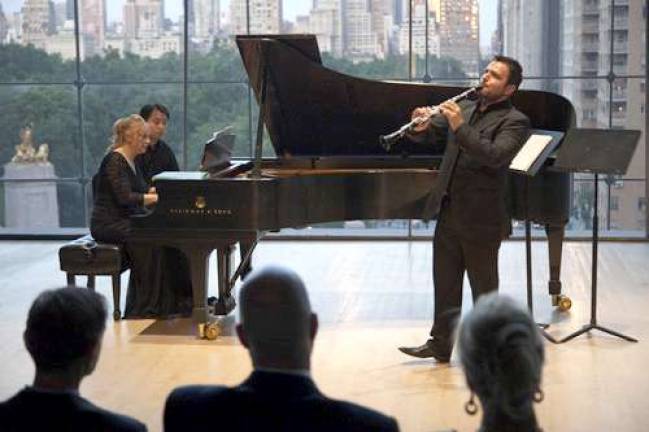Music of the Heavens

Musica Mundana's transcendent New York performance By Judy Gelman Myers Mundana is the worst kind of false cognate: it pretends to mean its opposite. Musica mundana is not, as one would expect, mundane music at all but the music of the spheres, the sounds the planets make as they revolve in limitless space, a heavenly noise we could hear if we only opened ourselves to it. It's also the name of the excellent chamber ensemble that played Drom on May 23, in a program that flowed effortlessly from the Argentinean tangos of Piazzolla and Gardel to "Romanian Melody" by German Romantic composer Max Bruch and "Tango" by Stravinsky. For Musica Mundana, music is music, disregarding?or transcending?geographical borders and questions of genre. What allows this trio to move with dexterity and authenticity between varied material is its heterogeneity?each of its superb musicians combines classical training with a deep knowledge of ethnic traditions. A master of Debussy's piano scores, Turkish-born director Aysegul Durakoglu concertizes in Sephardic repertoire; Argentinean-born cellist Leo Grinhauz studied under Janos Starker and recorded with Paquito D'Rivera; Macedonian clarinetist Ismail Lumanovski, the first Rom to graduate from Juilliard, is a founding member of the New York Gypsy All-Stars. Their classical training forbids cheesy exaggeration while their ethnic roots forbid excessive rigidity. For example, Lumanovski rendered "Czardas," composed in 1904 byItalian Vittorio Monti but heard most often in Hungarian restaurants, with the virtuosity it required but none of the shenanigans that frequently accompany its playing, while Durakoglu and Grinhauz artfully supported Piazzolla's Four Seasons ("Autumn" and "Summer") with the force necessary to the tango's centrifugal drive without self-conscious enslavement to its syncopation. The true meaning of musica mundana revealed itself in Piazzolla's "Milonga," arranged as a clarinet-piano duet. Like Rodrigo in his Concierto de Aranjuez, Piazzolla captures something ineffably sad in the universe, a melancholy inherent in the turning of the spheres, transported on Lumanovski's clarinet with unsentimenal sympathy, an empathic, godlike recognition of the way things are. The show ended-perfectly-with Piazzolla's "Liber Tango," whose sophistication of harmonies, intricate interplay between melodic lines and syncopation give his music the kind of richness that makes you beg for just one more, for the evening to never end.